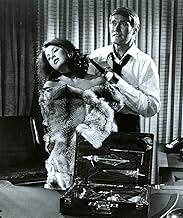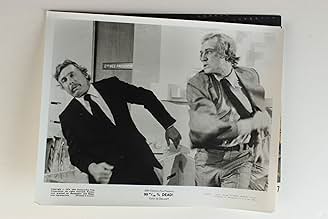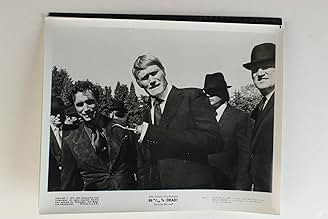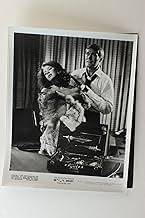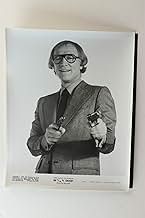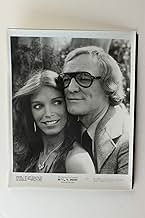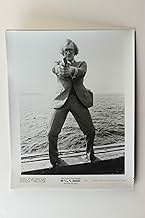IMDb-BEWERTUNG
5,6/10
886
IHRE BEWERTUNG
Füge eine Handlung in deiner Sprache hinzuUncle Frank Kelly calls on Harry Crown to help him in a gang war. The war becomes personal when Harry's new girlfriend is kidnapped by Uncle Frank's enemy, Big Eddie.Uncle Frank Kelly calls on Harry Crown to help him in a gang war. The war becomes personal when Harry's new girlfriend is kidnapped by Uncle Frank's enemy, Big Eddie.Uncle Frank Kelly calls on Harry Crown to help him in a gang war. The war becomes personal when Harry's new girlfriend is kidnapped by Uncle Frank's enemy, Big Eddie.
- Auszeichnungen
- 1 Nominierung insgesamt
Zooey Hall
- Tony - The Kid
- (as David Hall)
Janice Heiden
- Clara
- (as Janis Heiden)
Tony Brubaker
- Burt
- (as Anthony Brubaker)
Bennie E. Dobbins
- Driver
- (as Bernie Dobbins)
Tom Anfinsen
- Dakota
- (Nicht genannt)
Benjie Bancroft
- Gangster
- (Nicht genannt)
Empfohlene Bewertungen
"99 and 44/100% Dead!" is usually known as one of John Frankenheimer's lesser movies, but it's entertaining enough for its short run. This typical gangster spoof casts Richard Harris as a hitman hired by his uncle due to a challenge by a rival gangster. I moved to Seattle last year, so it was neat to see some of the places where I've been (namely Gasworks Park). They don't say where it takes place, but most of it does appear to be the Emerald City.
Yeah, it was pretty much what I expected: lots of gunfire, hot babes, and cool fight scenes. Frankenheimer later admitted that he didn't really know what kind of movie he was making. I guess that after "The Birdman of Alcatraz" and "Seven Days in May", he felt like he was getting held to high standards. As far as I'm concerned, this movie is all about just being funny, and it is. Good enough.
Yeah, it was pretty much what I expected: lots of gunfire, hot babes, and cool fight scenes. Frankenheimer later admitted that he didn't really know what kind of movie he was making. I guess that after "The Birdman of Alcatraz" and "Seven Days in May", he felt like he was getting held to high standards. As far as I'm concerned, this movie is all about just being funny, and it is. Good enough.
John Frankenheimer's post modern stab at the crime genre comes hot off the heels of Michael Ritchie's Prime Cut (from the same author no less), only the tone is more cutesy and the body count is nearly tripled. After a Pycal-inspired opening and an excellent underwater graveyard montage, we are introduced to pearly pistol gripped gangster Richard Harris who's en route to Chicago (?) to help win a dangerous mob war. The substandard mafia plot sits second tier to the film's sporadic comedy spoofing and mugging, much of what both fails and succeeds simultaneously at the hands of its dramatic director who must have been at the peek of his well publicized cocaine binge. Harris, with his balding curl mullet and wide-brimmed glasses resembles a young Michael Caine or Woody Allen depending on the lighting and camera angle, but performs his actions and delivers his dialog like a stone cold stoic; the juxtaposition is startling and dare I say cool as hell. Action scenes come out of nowhere and are framed and executed with professionalism, including a crazy ambush on an elevated bridge, and Chuck Conner's interchangeable James Bond claw which can alternate between knives and sex toys given the occasion. Much maligned and obscure gem. The skeletal dead humans and accompanying narrator reminds me of the Pirates of the Caribbean ride at Disneyland.
Robert Dillon's script was considered by producer Joe Wizan to be a black comedy along the lines of Dillon's earlier one for "Prime Cut" (1972: d. Michael Ritchie). Director Frankenheimer, on returning to the USA after much time in France, was faced with a situation wherein years of bad reviews of his films were taking their toll. He accepted this project, and wanted Robert Mitchum for the main role, but the producers wanted Richard Harris, fresh from the hit film "A Man Called Horse".
Critically however, the released film was felt to be a total fiasco, many reviewers holding that it represented the director's career at rock bottom. The film's dark, bleak humour and use of caricature were considered testimony to a certain sadism on Frankenheimer's part, and evidence of his growing contempt. In later years, even the great director plays down this most unusual gangster satire.
It concerns a hitman trapped between rival gangs, and takes place in a vaguely futuristic city, which seems spatially to constantly re-define itself. It is filmed obliquely, so one is never on sure footing as to how to react. What is most interesting about this peculiarity, are the number of bizarre, surrealistic pop-culture set-pieces in a world of futile violence and rampant egos. Only despair and nihilism at the absurdity of it all enables the characters to hold on to whatever shreds of honour they can maintain although they all succumb to personal pride at the expense of everything else.
Frankenheimer directs with a stylistic over-kill at times which sits uneasily with a certain lethargic quality, although it probably guarantees the film a cult audience in the future. Perhaps the film is best seen as a failed, but intriguing attempt to reconcile the director's frequent recourse to stylization with genre-based social satire. Still, the film seems uncertain of its aims, and tends to flounder in its often considerable visual panache. The remarkable opening sequence however, is amongst the oddest ever put to film, and typifies the film's sense of comic despair. A curio.
Critically however, the released film was felt to be a total fiasco, many reviewers holding that it represented the director's career at rock bottom. The film's dark, bleak humour and use of caricature were considered testimony to a certain sadism on Frankenheimer's part, and evidence of his growing contempt. In later years, even the great director plays down this most unusual gangster satire.
It concerns a hitman trapped between rival gangs, and takes place in a vaguely futuristic city, which seems spatially to constantly re-define itself. It is filmed obliquely, so one is never on sure footing as to how to react. What is most interesting about this peculiarity, are the number of bizarre, surrealistic pop-culture set-pieces in a world of futile violence and rampant egos. Only despair and nihilism at the absurdity of it all enables the characters to hold on to whatever shreds of honour they can maintain although they all succumb to personal pride at the expense of everything else.
Frankenheimer directs with a stylistic over-kill at times which sits uneasily with a certain lethargic quality, although it probably guarantees the film a cult audience in the future. Perhaps the film is best seen as a failed, but intriguing attempt to reconcile the director's frequent recourse to stylization with genre-based social satire. Still, the film seems uncertain of its aims, and tends to flounder in its often considerable visual panache. The remarkable opening sequence however, is amongst the oddest ever put to film, and typifies the film's sense of comic despair. A curio.
It's certainly different, but it's not very good. Richard Harris plays a hit-man hired by a mob boss to knock off a rival. Director John Frankenheimer starts things off with a bang with Roy Lichtenstein inspired titles and a pretty fun shoot out/car chase. The film itself is so slow that quirky touches like a giant balloon sculpture, a lesson on cement shoes and an incorporated brothel offer a lot of relief. Harris looks otherwise engaged and Ann Turkel, though gorgeous, isn't much of an actress...and she's certainly too classy to be convincing as a school teacher/dancer named Buffy! A very old and tired looking Edmond O'Brien plays "Uncle" Frankie, the mob boss --- he looks like a puffy Humphrey Bogart and sounds like a near dead Jason Robards. Connors " plays "Claw" and clearly has a lot of fun with his prosthetic. Bradford Dillman is awful as O'Brien's rival...he affects some sort of Brooklyn accent even though no one else does AND the film is set in L.A. Henry Mancini's jazzy score is great, but becomes increasingly intrusive as the film progresses.
Flaws aside, the film is surely a high-water mark in the spotty career of Richard Harris...he went on to star in ORCA, THE CASSANDRA CROSSING, etc.
Flaws aside, the film is surely a high-water mark in the spotty career of Richard Harris...he went on to star in ORCA, THE CASSANDRA CROSSING, etc.
Oddball take on the gangster movie courtesy of screenwriter Robert Dillon and director John Frankenheimer. Richard Harris is Harry Crown, a killer in the employ of mob boss Frank Kelly (Edmond O'Brien). Frank hires Harry to rub out Frank's chief rival, Big Eddie (Bradford Dillman), but Big Eddie ups the stakes by kidnapping Harry's new lady friend Buffy, played by Harris's real-life wife Ann Turkel. It takes place in a slightly futuristic milieu, and the fact that it's intended to be a satire and is never exactly taking itself that seriously is its main appeal, with the cartoon opening credits establishing the tone early on. It comes up with some effective images along the way, like the scores of corpses wearing cement shoes that have been dumped into the ocean (accompanied by Harris's narration) and the sight of actual alligators in the sewers. There's also the rousing music score by Henry Mancini to add to the fun factor. The problem is that the movie just doesn't have a whole lot of energy; it falls flat a lot of the time. It plods a little too much and seems longer than it is. In any event, the cast certainly gives it 100 (as opposed to 99 and 44/100) percent, with a droll Harris in the lead, and highly amusing performances by O'Brien and Dillman. Turkel, Janice Heiden as Clara, and Kathrine Baumann as Baby all provide the movie with appreciable eye candy. In fact, Baumann figures in what is one of the better sequences in the movie when Harry is working to prevent a bomb from going off; the sequence has fine tension. A good unlikely chase sequence involves a school bus, but one of the most enjoyable elements is seeing Harry take on Big Eddie's enforcer, Marvin "Claw" Zuckerman, played to the hilt by the wonderful Chuck Connors, so named because he puts claws, guns, and other implements on the end of his arm where Harry had hacked off the real deal some time ago. This could and should have been more fun overall, but it does have its moments. Fans of the actors should be satisfied. Six out of 10.
Wusstest du schon
- WissenswertesThe film's alternative title, "99 and 44/100% Dead", parodies the famous Ivory Soap advertising slogan, "99 - 44/100% Pure". In Great Britain, where the soap advertisement was unknown (and where Ivory Soap was not obtainable), the film - after first retaining its American name for the initial several weeks of release - had its title hastily changed to the more mundane "Call Harry Crown"; this did nothing to improve its box-office performance.
- Zitate
Harry Crown: [to Tony the Kid, while smoking a cigar] You know, Kid, a cigar don't care who smokes it.
- Crazy CreditsThe end credit show stills from the movie except for the last part which is a pop art animation still that says WHAM!
- Alternative VersionenThe Fox Movie Channel version edits out 4 minutes from the film for time constraints.
- VerbindungenFeatured in Born in the USSR: Born in the USSR: 7 Up (1991)
- SoundtracksEasy, Baby
Music by Henry Mancini
Lyrics by Alan Bergman and Marilyn Bergman
Sung by James Gilstrap (as Jim Gilstrap)
Top-Auswahl
Melde dich zum Bewerten an und greife auf die Watchlist für personalisierte Empfehlungen zu.
- How long is 99 and 44/100% Dead!?Powered by Alexa
Details
Box Office
- Bruttoertrag in den USA und Kanada
- 40.325 $
- Laufzeit
- 1 Std. 38 Min.(98 min)
- Farbe
- Seitenverhältnis
- 2.35 : 1
Zu dieser Seite beitragen
Bearbeitung vorschlagen oder fehlenden Inhalt hinzufügen


